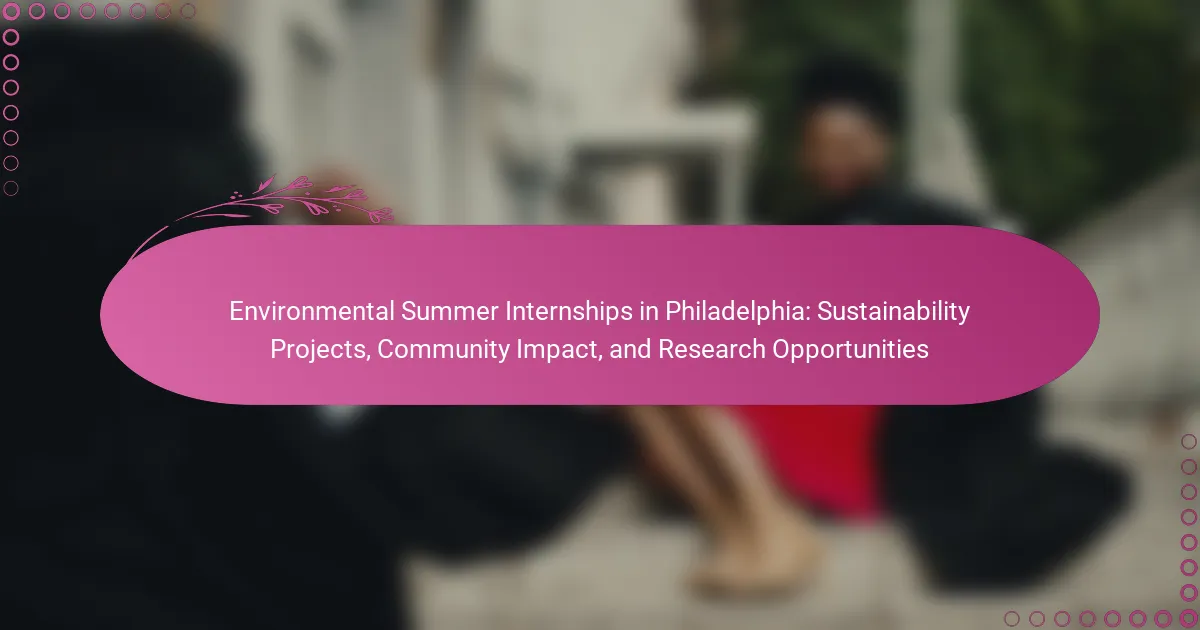

What are Environmental Summer Internships in Philadelphia?
Environmental summer internships in Philadelphia are programs that provide students and recent graduates with hands-on experience in environmental conservation and sustainability. These internships typically involve working with non-profit organizations, government agencies, or private companies focused on ecological projects. Interns engage in activities such as research, community outreach, and project management.
These opportunities help interns develop practical skills and knowledge in environmental science and policy. Interns may work on projects related to urban sustainability, wildlife conservation, or climate change mitigation. Philadelphia offers a range of internships each summer, making it a hub for aspiring environmental professionals. Many organizations in the city seek to involve interns in meaningful work that contributes to community well-being and ecological health.
How do these internships contribute to sustainability initiatives?
These internships contribute to sustainability initiatives by engaging students in real-world environmental projects. Interns often work on projects that promote energy efficiency, waste reduction, and conservation efforts. For example, they may assist in developing community gardens or conducting environmental impact assessments. These hands-on experiences help interns understand sustainable practices and their importance. Moreover, the initiatives often lead to measurable outcomes, such as reduced carbon footprints or increased biodiversity in urban areas. By participating in these internships, students gain valuable skills while contributing to the overall sustainability goals of their communities.
What types of sustainability projects are included in these internships?
Internships in Philadelphia often include various sustainability projects. These projects typically focus on renewable energy initiatives. They may involve community gardens and urban agriculture programs. Interns might also participate in waste reduction and recycling campaigns. Water conservation projects are frequently included as well. Additionally, some internships address climate change awareness and education. These projects aim to create a positive environmental impact. They provide hands-on experience in sustainability practices.
How do interns engage with local communities through these projects?
Interns engage with local communities through sustainability projects by participating in hands-on activities. They collaborate with local organizations to address environmental issues. Interns often conduct workshops to educate community members about sustainable practices. They also participate in community clean-up events, which fosters direct interaction. Additionally, interns gather data on local environmental conditions, which benefits community awareness. Their involvement helps build relationships between institutions and residents. Interns contribute to community-led initiatives, enhancing local capacity for sustainability. This engagement ultimately promotes a shared commitment to environmental stewardship.
Why are these internships important for environmental research?
Internships in environmental research are crucial for practical experience. They provide hands-on training in real-world scenarios. Participants learn to apply theoretical knowledge to environmental issues. These internships foster collaboration with professionals in the field. They also enhance networking opportunities for future careers. Furthermore, they contribute to ongoing research projects that address sustainability. Interns can gather data and analyze environmental impacts firsthand. This experience is vital for developing effective solutions to pressing environmental challenges.
What research opportunities are available for interns?
Interns have access to various research opportunities focused on environmental sustainability. These opportunities include data collection and analysis related to local ecosystems. Interns may also engage in studies assessing community impacts of sustainability initiatives. Field research is often conducted in collaboration with local organizations. Interns can participate in projects that evaluate the effectiveness of green technologies. Research may involve literature reviews on environmental policies and practices. Additionally, interns can contribute to reports that inform community stakeholders. These experiences enhance interns’ understanding of real-world environmental challenges.
How do these research projects impact local environmental policies?
Research projects significantly influence local environmental policies by providing data-driven insights. These insights guide policymakers in decision-making processes. For example, studies on air quality can lead to stricter emissions regulations. Research on community water sources can prompt improved water management practices. Additionally, projects that assess biodiversity can result in habitat protection initiatives. Evidence from these studies often highlights urgent environmental issues. Policymakers rely on this information to create effective policy frameworks. Ultimately, research fosters informed, sustainable practices within local governance.

What skills can interns gain from Environmental Summer Internships?
Interns can gain a variety of skills from Environmental Summer Internships. These skills include project management, teamwork, and research abilities. Interns often learn to analyze environmental data and assess sustainability practices. They develop communication skills through presentations and reports. Additionally, they gain hands-on experience with environmental tools and technologies. Problem-solving skills are enhanced by addressing real-world environmental challenges. Networking opportunities with professionals in the field are also valuable. Interns may learn about policy advocacy and community engagement strategies. These competencies are essential for future careers in environmental science and sustainability.
How do internships enhance professional development in sustainability?
Internships enhance professional development in sustainability by providing hands-on experience in real-world applications. They allow individuals to work on sustainability projects that address environmental challenges. Participants gain practical skills and knowledge that are directly applicable to their future careers. Internships also facilitate networking opportunities with industry professionals. This exposure can lead to mentorship and job opportunities in the sustainability sector. According to a study by the National Association of Colleges and Employers, 60% of internships lead to full-time job offers. Additionally, internships help individuals understand the complexities of sustainability practices in various contexts. This experience is crucial for developing a comprehensive understanding of the field.
What specific skills are developed during these internships?
Internships in environmental sustainability develop critical skills such as project management, research analysis, and teamwork. Participants learn to manage sustainability projects effectively, ensuring timely completion and adherence to goals. Research analysis skills are honed through data collection and evaluation of environmental impacts. Teamwork is emphasized as interns collaborate with peers and community stakeholders. Communication skills improve through presentations and reports on sustainability initiatives. Problem-solving abilities are enhanced by addressing real-world environmental challenges. Networking skills are developed by engaging with professionals in the sustainability field. These skills are essential for future careers in environmental science and related disciplines.
How do these skills translate to future career opportunities?
Skills gained from environmental summer internships translate to future career opportunities by enhancing employability in sustainability-focused roles. Interns develop practical experience in project management, research, and community engagement. These skills are highly valued by employers in sectors such as environmental consulting, non-profits, and government agencies. For example, a study by the National Association of Colleges and Employers found that 60% of employers prioritize internships as a key factor in hiring decisions. Additionally, strong communication skills honed during internships can lead to roles in advocacy and public relations. Proficiency in data analysis from research projects prepares interns for analytical positions in various industries. Overall, these internships equip individuals with a skill set that aligns with the growing demand for sustainability expertise in the job market.
What networking opportunities are available through these internships?
Internships in environmental sustainability provide numerous networking opportunities. Interns often connect with industry professionals, including sustainability experts and community leaders. They may attend workshops and seminars that facilitate interaction with peers and mentors. Collaboration on projects allows interns to build relationships with local organizations and government agencies. Networking events hosted by internship programs further enhance connections within the field. Engaging with alumni from similar programs can also lead to valuable insights and job opportunities. These networking experiences can significantly impact career advancement in environmental sectors.
How do interns connect with professionals in the sustainability field?
Interns connect with professionals in the sustainability field through networking events and workshops. These gatherings provide opportunities for direct interaction. Interns can participate in conferences focused on sustainability topics. Many organizations offer mentorship programs that pair interns with experienced professionals. Social media platforms like LinkedIn facilitate connections between interns and industry experts. Additionally, internships often include collaborative projects that promote teamwork with professionals. Universities frequently host career fairs featuring sustainability organizations. Engaging in community service projects also allows interns to meet professionals in the field. These connections can lead to future job opportunities and collaborations.
What role do mentorship programs play in these internships?
Mentorship programs play a crucial role in environmental summer internships. They provide guidance and support to interns throughout their experience. Mentors help interns navigate project challenges and develop professional skills. This relationship enhances the learning process and fosters personal growth. Research indicates that mentorship increases internship satisfaction and retention rates. A study by the National Mentoring Partnership found that mentored individuals are 55% more likely to enroll in college and 78% more likely to volunteer regularly. Thus, mentorship programs significantly contribute to the success of internships in sustainability projects and community impact initiatives.

How can students apply for Environmental Summer Internships in Philadelphia?
Students can apply for Environmental Summer Internships in Philadelphia by searching for available positions on various platforms. Websites like Indeed, Glassdoor, and local university career services often list internship opportunities. Students should also visit the websites of environmental organizations and nonprofits in Philadelphia, such as the Pennsylvania Environmental Council or the Delaware Riverkeeper Network.
Networking is essential; students can attend local environmental events or join related student organizations. Many internships require a resume and cover letter, which should highlight relevant coursework and skills. Some organizations may also request letters of recommendation.
Application deadlines typically fall in early spring, so students should prepare their materials in advance. Following up with organizations after submitting applications can demonstrate interest.
What are the eligibility requirements for applicants?
Eligibility requirements for applicants typically include being enrolled in a relevant degree program. Applicants should have completed at least one year of undergraduate study. A strong interest in sustainability and environmental issues is essential. Relevant coursework or experience in environmental science or related fields is often required. Applicants may need to submit a resume and cover letter. Some internships may require letters of recommendation. Availability for the entire duration of the internship is usually necessary. Specific requirements can vary by organization or project.
How can students prepare a successful application?
Students can prepare a successful application by thoroughly researching the internship program. Understanding the organization’s mission and projects is crucial. Tailoring the application materials to align with those goals enhances relevance. Including specific examples of past experiences demonstrates capability. Highlighting skills related to sustainability and community impact is essential. Obtaining strong letters of recommendation adds credibility. Proofreading for clarity and professionalism is vital. Submitting the application before the deadline ensures consideration.
What resources are available to help students find these internships?
Students can utilize various resources to find environmental summer internships in Philadelphia. University career centers often provide listings of available internships. Online job boards such as Indeed and Glassdoor feature specific internship opportunities. Networking events and career fairs allow students to connect with potential employers. Professional organizations in sustainability also offer internship postings. Social media platforms like LinkedIn can help students discover internships through connections. Additionally, websites dedicated to environmental careers provide targeted listings. Local nonprofit organizations may have internship programs focused on community impact. Overall, leveraging these resources increases students’ chances of securing relevant internships.
What tips can enhance the internship experience for students?
To enhance the internship experience for students, they should actively seek feedback from supervisors. Regular feedback helps identify areas for improvement and growth. Students should also network with colleagues and industry professionals. Building connections can lead to future job opportunities and collaborations. Setting clear goals at the beginning of the internship is crucial. Defined objectives provide direction and focus throughout the experience. Engaging in diverse tasks can broaden skill sets. Exposure to various responsibilities enhances learning and adaptability. Finally, maintaining a positive attitude fosters a productive work environment. A positive mindset encourages collaboration and resilience in facing challenges.
How can interns maximize their impact on sustainability projects?
Interns can maximize their impact on sustainability projects by actively engaging in research and collaboration. They should seek to understand the specific goals of the project. This understanding allows interns to contribute relevant ideas and solutions. Interns can also participate in community outreach efforts. Engaging the community fosters support and amplifies project visibility. Additionally, interns should document their findings and progress. This documentation can provide valuable insights for future projects. Networking with professionals in the field can open doors for mentorship and guidance. Interns who take initiative in these areas often see greater project success. Studies show that active participation increases project effectiveness by up to 30%.
What best practices should interns follow during their internships?
Interns should prioritize effective communication during their internships. Clear communication fosters collaboration and ensures understanding of tasks. Interns should also seek feedback regularly. This practice helps them improve their skills and performance. Time management is crucial for meeting deadlines and managing workload effectively. Interns must be proactive in taking initiative. This demonstrates enthusiasm and commitment to their role. Networking with colleagues can provide valuable connections and insights. Interns should maintain a positive attitude, even in challenging situations. A positive mindset enhances the work environment and personal growth. Lastly, documenting experiences and lessons learned can aid in future career development.
Environmental summer internships in Philadelphia provide students and recent graduates with practical experience in sustainability and environmental conservation. These internships involve collaboration with various organizations on projects related to urban sustainability, wildlife conservation, and climate change mitigation. Interns gain essential skills in project management, research, and community engagement while contributing to local sustainability initiatives. The article will explore the types of projects available, the impact of these internships on environmental policies, and the networking and mentorship opportunities that enhance professional development in the field. Additionally, it will outline application processes and tips for maximizing the internship experience.






